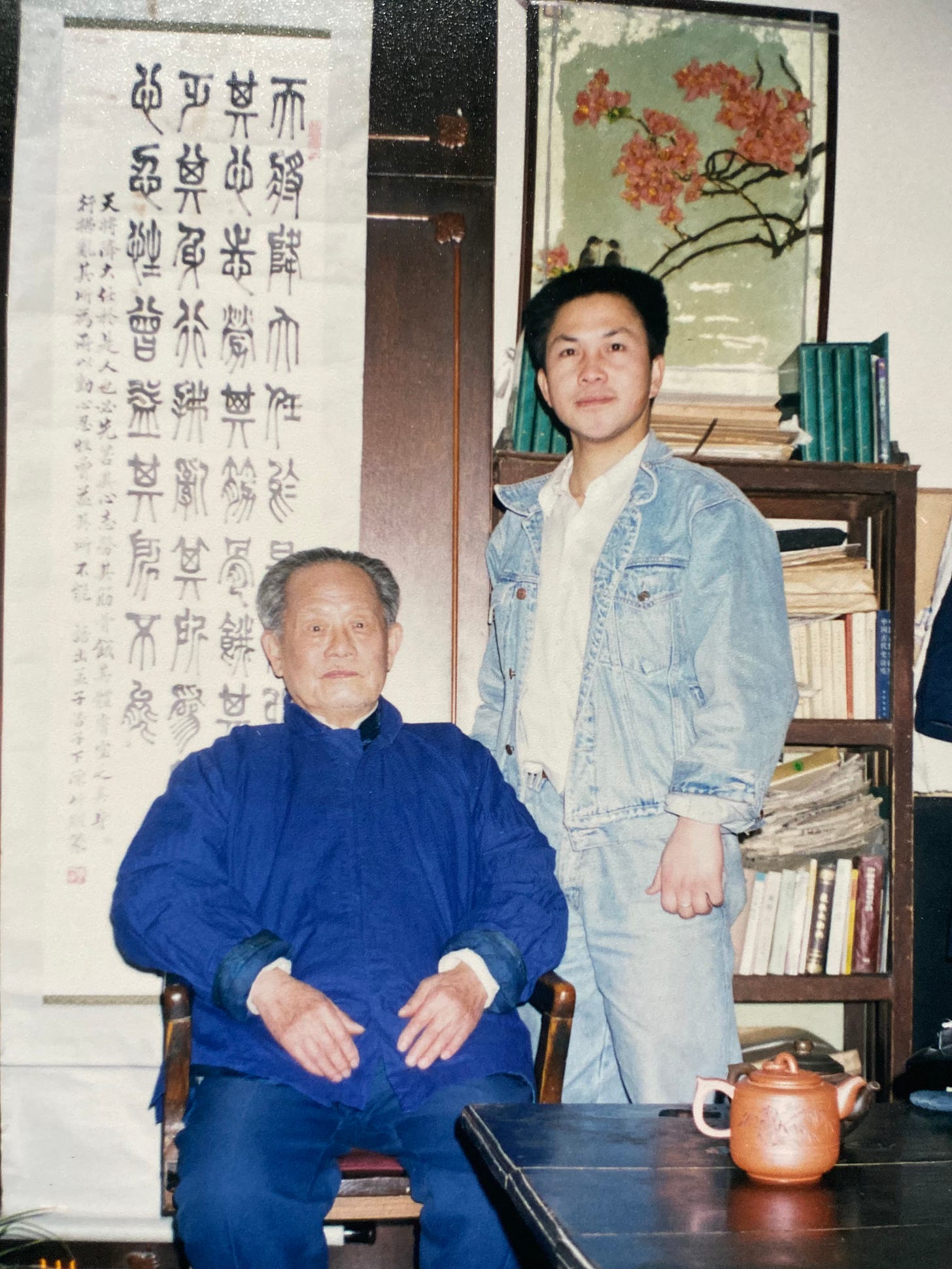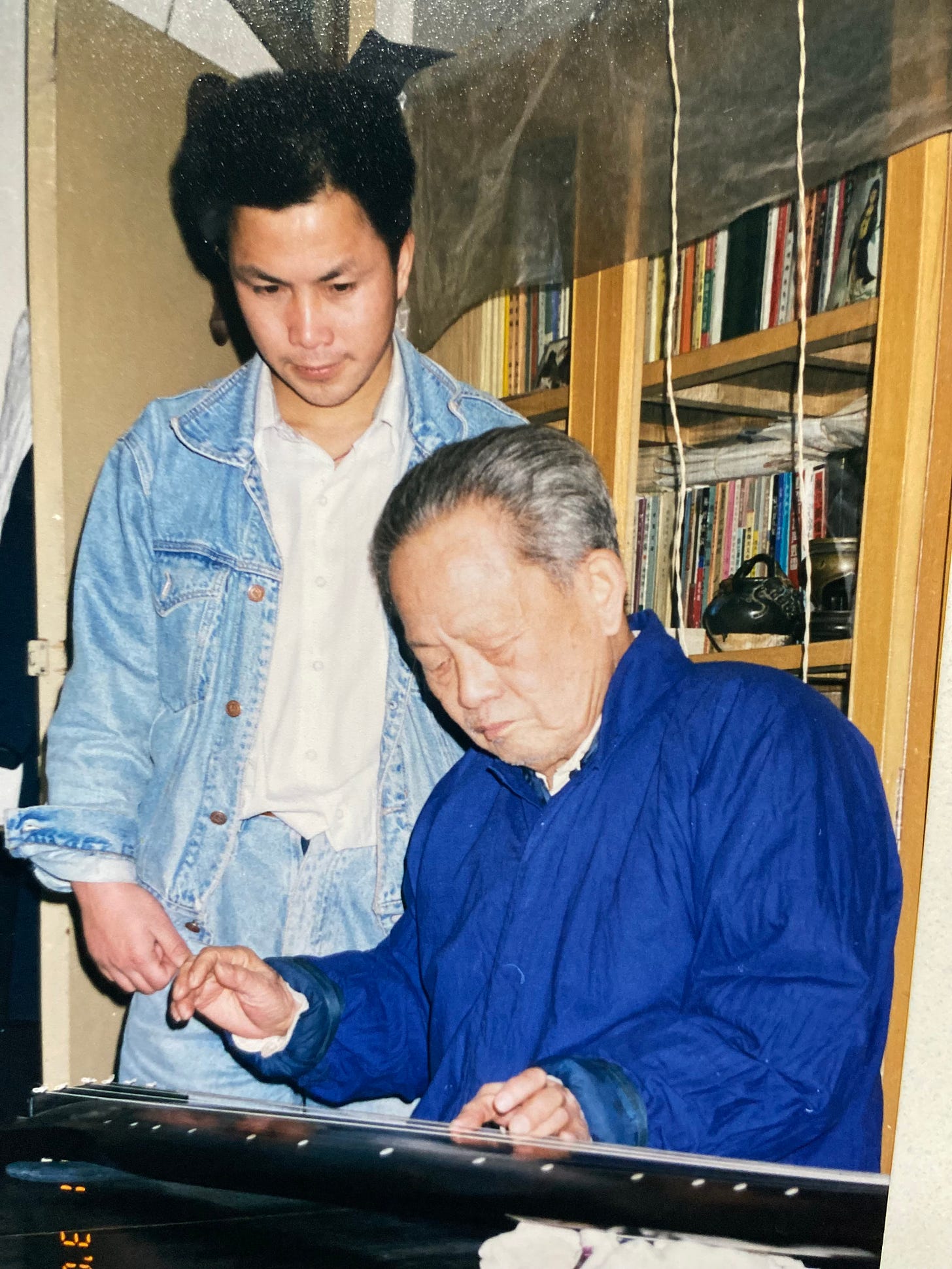Impressions of GrandMaster Li Fan 李璠
Introduction
As I grow more grey hairs, I find myself reading stories from years ago and its almost as though I can feel myself age alongside the stories.
In these moments I remind myself not to get lost living within the memories! For decades, I have been committed to the practices of Daoist internal arts, those that teach us to use our Qi to soften body and mind, and how the power of inner transformation can allow us to return to the original state of vitality. I do not believe that living within your memories is the key to holding one young.
It is for this reason that I typically do not write about my memories and instead focus on writing about and living in the present.
Last month, I received a text message from WangNing 王寧, a friend and fellow Qin player of mine in China, asking if I would write a short article about Grandmaster Li Fan 李璠. After some consideration, I agreed. Stories of Grandmaster Li Fan are not simply memories, they are parts of my life are especially relevant to my life as a teacher.
Who is Grandmaster Li Fan?
Li Fan (C.E. 1914-2007), a plant geneticist, graduated from the Agricultural College of Sichuan University in 1941, and served as researcher at the China Education and Culture Foundation, director of the Plant Genetics Department of the Chinese Institute of Genetics, and researcher at the Institute of Genetics of the Chinese Academy of Sciences. Impressive as that was, I knew him as a master of the traditional Chinese musical instrument, the GuQin.
Memory is an interesting thing. While I have little or even no memories of so many of the people and experiences I have had throughout my life, some unintentionally selected individuals or moments have been miraculously imprinted upon my brain. Grandmaster Li Fan was one of these miracles for me.
I still have a very vivid memory of the moment I first felt a strong pull to meet with Grandmaster Li Fan:
In the mid-1990s, I had the very good fortune to begin my journey of playing the GuQin with esteemed Grandmaster Li MingZhong 李明忠 of Xi'an. As a young man, Grandmaster Li MingZhong practiced internal martial arts with renowned martial artist Grandmaster Zhang Tong 张桐 and learned inner Qi cultivation methods from the distinguished Qin Music player, Grandmaster Wu ZhaoJi 吴兆基. Grandmaster Li MingZhong knows how to Guan Qi 貫氣, or how to empower his GuQin playing with his Qi. Every time I watch him play, I feel his music drumming with thunder, rustling with wind, or quenching with rain - he brings the natural spirits within each song to life.
One day, during a break, Grandmaster Li MingZhong learned that I was interested in ancient Chinese philology. He mentioned to me that Grandmaster Li Fan had a deep knowledge of ancient characters, and I immediately expressed a wish to visit with Grandmaster Li Fan. Grandmaster Li MingZhong began to tell me more about Grandmaster Li Fan, describing him to me as a supremely peaceful person, as gentle as the light. If a beggar came to visit, Grandmaster Li Fan would treat him as an honorable guest. Throughout the conversation, I grew more respect for Grandmaster Li Fan and I became even more interested in visiting him. What I couldn’t have known at the time was that seeds from this seemingly random conversation were planted into my heart. From then on, I have always reminded myself to treat everyone with respect and kindness.
Savoring the Tea
At that time in my life, I was working at the Aerospace Electronics Technology Research Institute in Xi'an, which had its headquarters in Beijing. I had frequent opportunities to travel to Beijing for work and took advantage of these opportunities to visit Grandmaster Li Fan.
As soon as I entered his home for the first time, he invited me to sit down and he poured me a cup of Pu-er tea that he had just brewed in a clay pot. Next, he told me that he was traditional and liked to boil and drink Pu'er in this way.
During this time period I had also been making tea every day, and I often made Gongfu tea. I had only heard of boiled Pu-er tea before, that it was more delicious and very nourishing for digestion, but I had never made or drunk boiled Pu-er tea before. Since experiencing this tea, first made for me by Grandmaster Li Fan, I slowly learned the secrets to cooking it myself. For the past 20+ years, every time I present a Dao of tea ceremony to tea friends around the world, the scene of drinking boiled Pu’er tea for the first time with Grandmaster Li Fan always appears in my mind.
While we were sipping tea and chatting, Grandmaster Li Fan asked about my hometown. I told him that I was from a small village outside of Wenling, in Zhejiang Province. This area is next to Haimen 海門 (later renamed Jiaojiang 椒江), the hometown of Grandmaster Xu Yuanbai 徐元白 (1892-1957), a very famous Qin master. Then Grandmaster Li Fan pointed to the GuQin on his table and told me that Xu Kuanghua 徐匡華, the son of Xu Yuanbai, who was also a well known GuQin master and maker of GuQin, had just gifted him the GuQin a few days prior. Do you know the famous movie from 2002, Hero? The blind Qin master in that film was played by Xu Kuanghua. Anyway, Grandmaster Li Fan generously offered me an opportunity to play it. I played him "Yang Guan San Die," a traditional song that depicts the spiritual connection between friends who are about to part ways.
At the end of my song, the old Qin master sighed: "At my age, I no longer play sad songs. Life is not easy, and I have experienced too many things. I now delight in the music of the Qin and find the joy within them. These days, my living environment is like living in a chicken cage. When I play "GaoShan" [a song about the virility, depth, decency, and nobleness of the mountain], it brings me back to the garden and being close to the natural world."
Look up
After visiting the Grandmaster Li Fan several more times, he agreed to teach GaoShan (High Mountain) to me. Sadly, due to many unforeseen barriers, I was ultimately unable to fulfill my wish to learn the “High Mountain” song from him.
In 2001, after being recruited to teach at the National University of Naturopathic Medicine in Portland, Oregon, I resigned from my job as an engineer and moved to the United States for a new career and new life. I had no opportunity to visit with Grandmaster Li Fan in person after that, though we were able to share phone calls once in a while.
The last time I dialed his phone number, I was surprised to hear a different voice answer the line. It was his son who answered, letting me know that his father was seriously ill and could no longer contact the outside world.
Although I didn't learn "High Mountain" from Grandmaster Li Fan, his style of playing the Qin and his graciousness continue to influence me. Through his amazing ability to bring "High Mountain" to life when he played, I was further inspired to dedicate myself to deepening my own understanding of select Qin pieces. For example, the song Xiao Xiang Shui Yun ¨Mystical Clouds over the Xiao and Xiang Rivers¨ has become personal training for attaining spiritual freedom and internal qi transformation.
高山仰止
gāoshānyǎngzhǐ
The high mountain is looked up to
-ShiJing 詩經, the Classic of Poetry





